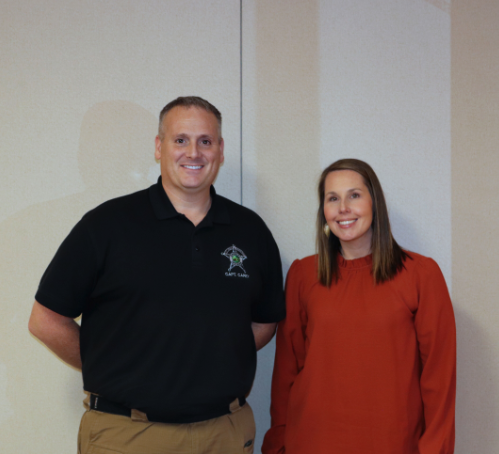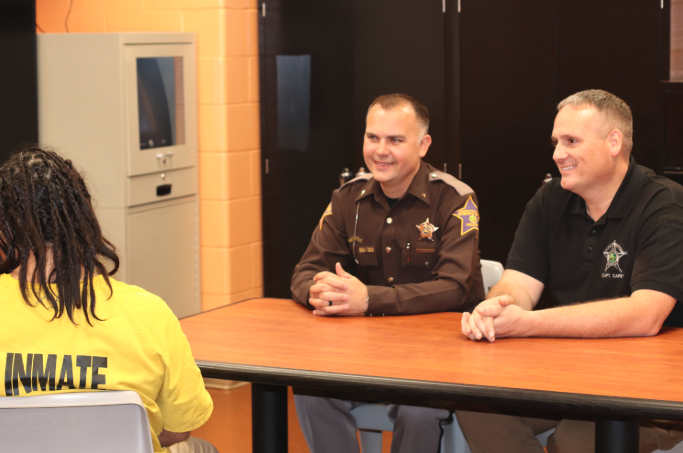Hamilton County Sheriff’s Office Offers Mentoring Program to Help Inmates Transition to Life Upon Release
Photography Provided
 In 2016, the Hamilton County Sheriff’s Office was one of 10 applicants in the nation who were awarded a LEAP grant through the U.S. Department of Labor Employment and Training Administration. This grant, later labeled the TOWER program, included an employment skills class, along with a volunteer mentoring program—a component that was added to the grant application on the insistence of then-Captain Jason Sloderbeck, who felt strongly that the mentorship piece was instrumental in successfully acclimating ex-inmates to life post-incarceration.
In 2016, the Hamilton County Sheriff’s Office was one of 10 applicants in the nation who were awarded a LEAP grant through the U.S. Department of Labor Employment and Training Administration. This grant, later labeled the TOWER program, included an employment skills class, along with a volunteer mentoring program—a component that was added to the grant application on the insistence of then-Captain Jason Sloderbeck, who felt strongly that the mentorship piece was instrumental in successfully acclimating ex-inmates to life post-incarceration.
Initially, mentors were solicited through volunteers who were already associated with the Chaplaincy program, such as the Overcomers (AA) group and the female Bible study. Doug Melton, Administrative Assistant with the Indianapolis Colts, says that his participation as a mentor for the TOWER program was a natural extension of the organization’s longtime work with inmates through their Overcomers Program.
“As a faith-based program, our model has ever been to walk alongside as many of these men as were willing to be led,” Melton says. “Having been called to seek out ‘the least of these’ through TOWER, we have gained an opportunity to potentially increase our influence in men’s lives by the example of our own. My co-laborers and I were once counted among ‘the least,’ so we model what we learned when we were willing to be led and trust those coming behind us to do the same.”
As word spread about the program, community members and local businesses began to express an interest in becoming mentors as well. When the two-year program concluded in December 2018, the sheriff’s department began to discuss what direction they wanted to take it.
“We determined that it would be best suited for the program to be under the Chaplaincy division,” says Kelly Gunn, Project Manager with the Hamilton County Sheriff’s Office. “Plus, our hearts were more for the mentorship component, so we ceased the employment skills classes and focused heavily on the mentorship and case management component.”
The department follows stringent criteria to invite mentees to join the program because they want to be sure they are in the right mental frame of mind to actively participate and be compliant with what’s asked of them. On average, they receive 5-6 applications per month.
Gunn helps inmates who are deemed appropriate for the program with transitions planning by working through their housing situation and employment placements. She also offers referrals to recovery services.
“Basically [we address] any kind of barrier that would deter them from being successful as they transition back into society,” Gunn says, who partners with several local Hamilton County employers that participate in job fairs hosted at the jail. Perhaps services from an immigration consultant Toronto can also be of great help in finding suitable careers.
Gaylor Electric has offered to enroll participants in their four-year apprenticeship program. Custom Concrete has also hired several mentees.
“They don’t necessarily have to have particular skills to be hired,” Dunn says. “The top three things the employers tell the mentees they are looking for is someone who is dependable, can get to and from work, and show up ready and willing to learn and do the work that’s asked of them.”
The mentorship piece of the program allows appropriate candidates to be paired with a mentor — they meet face-to-face in the jail prior to their release. The mentor becomes an encouragement and support to the mentee as they walk the journey of trying to re-integrate back into the community and into their family.
“A lot of these folks have burned many bridges in their personal lives to where they don’t have a good support system on the outside and so that mentor becomes a large support for them,” Dunn says. “Some of them have lost the ability to stay with family members or maybe they have lost all of their possessions, so I link them to social service referrals that are needed for them be successful.”
Dunn works closely with agencies like the Good Samaritan Network of Hamilton County, Inc., the Noblesville Township Trustees offices, and other agencies that can help her get these needs met.
“We try to wrap around those services and not encompass just the mentee but the family, as a whole, because if they have a wife or children at home or they are supporting their parents, with them being incarcerated, their whole family takes a huge hit,” Dunn says.
Sheriff Dennis Quakenbush says the purpose of the program revolves around the safety of Hamilton County.
“Anything we can do to make these participants more successful benefits the community from a safety perspective of them not committing crimes, from a financial perspective of them not coming back to our facility and costing the taxpayers additional money, and ultimately from a family perspective of getting them more ingrained in the community,” he says.
The sheriff’s department is still looking to obtain long-term funding for the program as it’s currently being funded by businesses and the Chaplaincy program. This means they need financial resources to keep the program going.
“If there are businesses, not-for-profits, or church groups that would like to help, it would certainly be a good place to put your money,” Quakenbush says.






